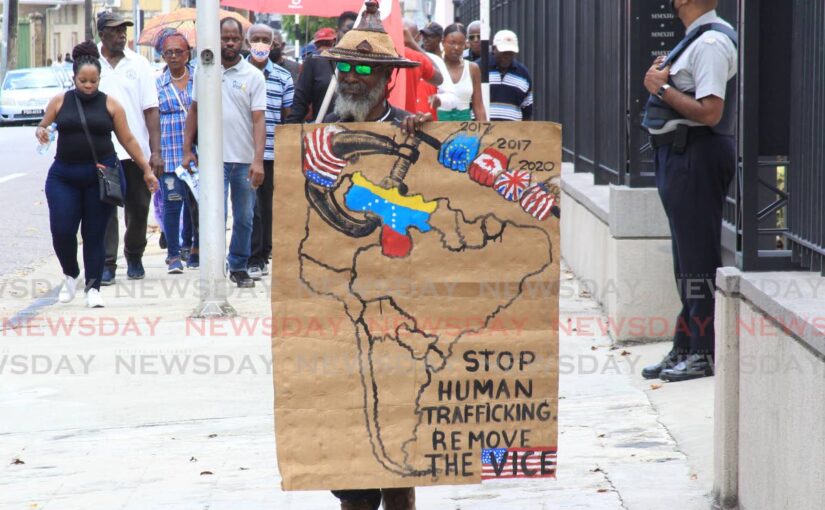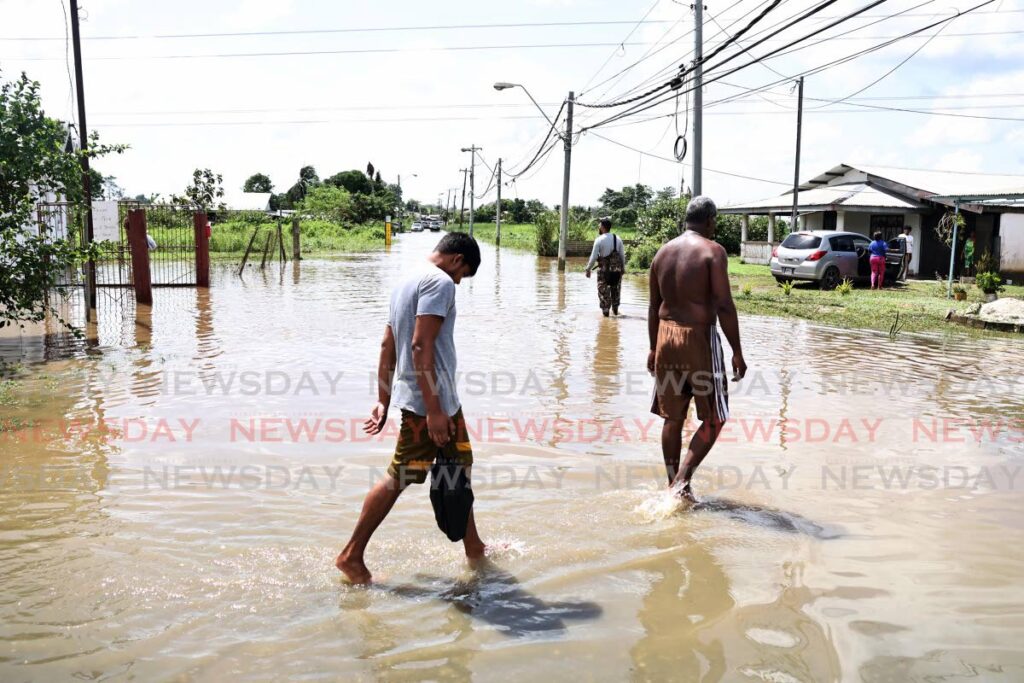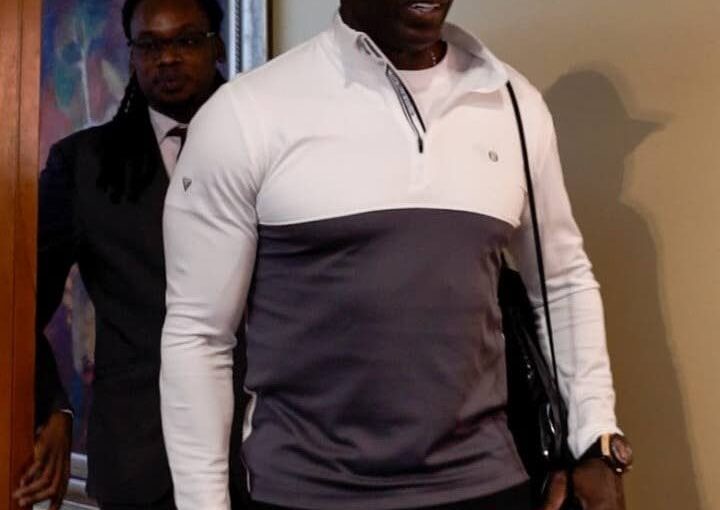

A man displays a placard during a march against human trafficking outside the Red House back in March 2023. FILE PHOTO -
OVER the past 11 years, 102 victims of human trafficking have been rescued in TT.
During the same period, 63 people have been charged for various offences arising from investigations into the exploitation of victims of this crime.
Migrants are the most vulnerable targets to human traffickers and the increased migration of Venezuelans into TT, many through irregular means, has worsened the problem.
Data collected since 2013 show that migrants are the most vulnerable to human trafficking in TT with 99 per cent of all victims being foreign nationals and Venezuelan nationals being the most impacted.
Sexual exploitation in the form of forced prostitution and sexual servitude has been the pervading form of exploitation and young women and girls the most exploited
>
The majority of the people charged with this crime are TT nationals.
These were some of the findings contained in the 2022 on Trafficking in Persons which was laid in the House of Representatives on November 22.
MANY FACTORS AT PLAY
The report said since the proclamation of the Trafficking in Persons Act in 2013, under the then UNC-led People's Partnership coalition government, "102 victims have been rescued and assisted and 63 persons have been charged for various offences arising from the investigations into the exploitation of the victims."
Human trafficking, the report continued is fueled by a demand for cheap labour, services, and commercial sex.
"Human Traffickers are those who employ force, fraud, or coercion to victimize others in their desire to profit from the existing demand."
The report said, "Prosecuting human traffickers is a key pillar in the fight against trafficking in persons and delivering justice to the victims. Prosecution involves identifying the perpetrators responsible for committing the crime of trafficking in persons and bringing them to justice."
Perpetrators, the report continued, can be men and women, intimate partners, complete strangers to the victims, criminal organisations, business owners, peers, family members, diplomats, farm owners, factory operators, large or small companies, or gangs."
The report added, "Thorough investigation leading to the prosecution and punishment of traffickers provides justice to victims and discourages further trafficking crimes."
>
In 2022, the National Security Ministry's Counter Trafficking Unit (CTU) received 103 reports of suspected cases of human trafficking, conducted seven exercises throughout the country and initiated eight further investigations.
The report said 12 people were detained for questioning and seven people were subsequently charged with trafficking in children, sexual assault, and other related offences.
The latter, who were charged in 2022, included one Chinese national and one Venezuelan national.
The report said "The Chinese national was previously charged in 2019 for another human trafficking matter involving minors."
These seven brought the total number of people charged for human trafficking and related offences, since the enactment of the Act in 2013, to 63.
In 2022, one person was committed to stand trial at the High Court and one matter was discharged.
Since 2013, nine of the accused have been committed to stand trial at the High Court, seven matters were dismissed, two accused were killed, and one person pleaded guilty to immigration related offences in aiding and abetting a victim to enter the country illegally.
The report said, "All the other matters remain at the preliminary inquiry stage at the Magistrate’s Court."
MIGRANTS AT RISK
>
While the act is the main legislation to charge perpetrators for human trafficking and trafficking in children, the offences committed against the victims may constitute a breach of other pieces of legislation including the Sexual Offences Act and the Offences Against the Person Act.
Some of the charges laid against these people include sexual intercourse with a minor, inciting a child to engage in sexual activities, keeping a brothel, possession of a firearm, receiving a benefit for the exploitation of a minor, possession of cocaine for the purpose of trafficking, rape and indecent assault and grevious sexual assault.
The report looked at the gender, nationality and age of the accused.
"Seven persons— six men and one woman, were charged for trafficking in children and other related offences in 2022. One was a national of China, the female was a national of Venezuela and the other five were citizens of TT. Their ages ranged from 20 to 50 years old."
The report said, "Since 2013, 64 persons—12 females and 52 males, have been charged for trafficking and other related offences."
Of the 63 accused, three were Chinese nationals, 11 were Venezuelan nationals and 49 were TT citizens.
The report said, "Global findings show that traffickers are predominantly citizens of the country where the exploitation of victims takes place. In TT, 78 per cent of the accused were citizens of this country."
While the data shows that more people in their early to mid-30's have been accused of trafficking in persons and related offences, persons of all age groups have been suspected of being involved in this nefarious activity.
TT has co-operated with several governmental, non-governmental, regional, and international organisations to combat human trafficking since 2013.
>
The report said, "In 2022 the CTU continued to partner with local and international organisations to investigate cases of human trafficking, provide accommodation and assistance to victims, and facilitate training opportunities.
The International Organization for Migration was identified as one organisation which continues to be "a key alliance providing accommodation and care packages for victims and conducting training and sensitization sessions to governmental and nongovernmental agencies."
Since 2001, the US State Department has issued a Trafficking in Persons (TIP) report which ranks governments based on their perceived efforts to acknowledge and combat human trafficking.
The report shows that TT has shifted from the tier 2 to the tier 2 watchlist of the TIP report from 2015-2022.
The former deals with governments that do not fully comply with the Victims of Trafficking and Violence Protection Act of 2000 (TVPA) but are making significant efforts to become compliant with the TVPA's minimum standards.
The latter deals with governments which don't fully comply with the minimum standards in the TVPA, are making significant efforts to do so but are seeing an increase in human trafficking victims or failing to show efforts to increase efforts to combat human trafficking from one year to the next.
Tier 3 on the TIP includes governments which don't comply with the TVPA's minimum standards and are making no effort to do so.
The report concluded that government "remains committed to the fight against this scourge of modern day slavery and will continue to dedicate resources to eliminate all forms human trafficking in this country."





